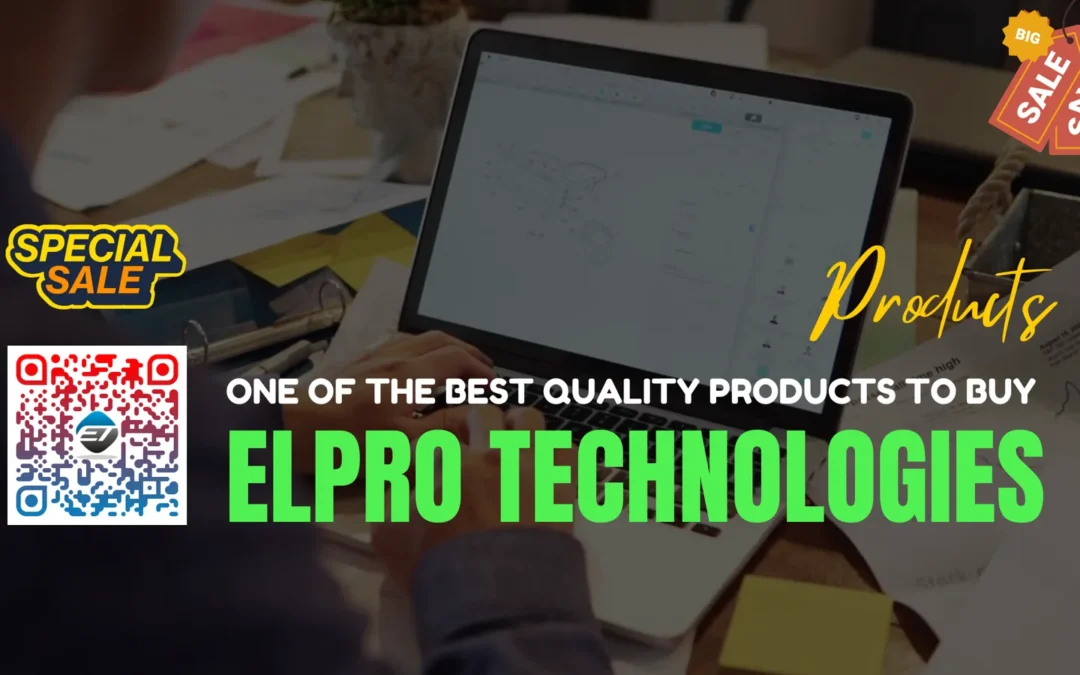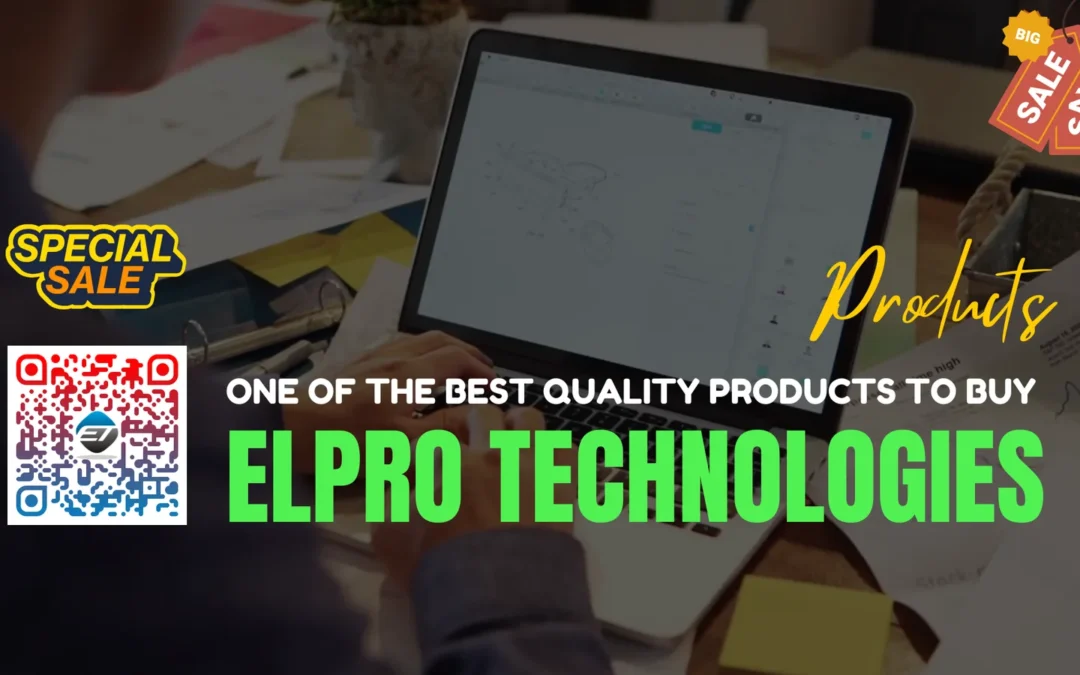
by super | Jan 30, 2026 | Elpro Technologies, Elpro Technologies Post
Industrial embedded computers and single board computers are essential components of compact automation systems. These computing platforms are widely used in kiosks, digital signage systems, automation controllers, and embedded industrial applications. Their compact size, low power consumption, and reliable performance make them ideal for space-constrained industrial environments.
Elpro Technologies offers a wide range of industrial embedded computers and single board computers designed for long-term industrial deployment. These systems support industrial-grade processors, extended temperature operation, and multiple I/O options. Embedded systems from Elpro are commonly used in OEM automation solutions and custom industrial applications.
Industries benefit from embedded computing solutions by achieving higher integration and lower system complexity. Elpro embedded computers integrate seamlessly with sensors, displays, communication modules, and automation software. This enables the development of customized automation solutions tailored to specific industry needs.
Long lifecycle availability is a critical factor for embedded computing systems. Elpro Technologies ensures extended product availability and technical support, allowing industries to maintain consistent system design over long periods. This reduces redesign costs and improves system reliability.
As automation systems continue to evolve toward compact and intelligent designs, embedded and single board computers will play an increasingly important role. Elpro Technologies continues to support this evolution by providing reliable embedded computing solutions that meet the demands of modern industrial applications.
Explore Elpro Industrial Product Categories
Kiosk – https://elprotech.online/kiosk-products/
Industrial PC – https://elprotech.online/industrial-pc-products/
Industrial Panel PC – https://elprotech.online/industrial-panel-pc-products/
Industrial Display – https://elprotech.online/industrial-display-products/
Industrial Tablet – https://elprotech.online/industrial-tablet-products/
Industrial Rugged Tablet – https://elprotech.online/industrial-rugged-tablet-products/
Fanless PC – https://elprotech.online/fanless-pc-products/
Fanless Computer – https://elprotech.online/fanless-computer-products/
Rugged Computer – https://elprotech.online/rugged-computer-products/
Rugged Tablet – https://elprotech.online/rugged-tablet-products/
Information Kiosk – https://elprotech.online/information-kiosk-products/
Interactive Kiosk – https://elprotech.online/interactive-kiosk-products/
Interactive Touch Screen – https://elprotech.online/interactive-touch-screen-products/
Touch Screen Kiosk – https://elprotech.online/touch-screen-kiosk-products/
Touch Screen Display – https://elprotech.online/touch-screen-display-products/
Touch Screen Monitor – https://elprotech.online/touch-screen-monitor-products/
Industrial Computer – https://elprotech.online/industrial-computer-products/
Industrial Motherboard – https://elprotech.online/industrial-motherboard-products/
Single Board Computer – https://elprotech.online/single-board-computer-products/
Embedded Computer – https://elprotech.online/embedded-computer-products/
Small PC – https://elprotech.online/small-pc-products/
Mini PC – https://elprotech.online/mini-pc-products/
Kiosk Display – https://elprotech.online/kiosk-display-products/
Kiosk Systems – https://elprotech.online/kiosk-systems-products/
Digital Standee – https://elprotech.online/digital-standee-products/
Digital Signage – https://elprotech.online/digital-signage-products/
Touch Screen – https://elprotech.online/touch-screen-products/
Computer Peripherals – https://elprotech.online/computer-peripherals-products/
Stainless Steel Keyboard – https://elprotech.online/stainless-steel-keyboard-products/
Virtual Dressing Room – https://elprotech.online/virtual-dressing-room-products/
Converters – https://elprotech.online/converters-products/
ID Card Printer – https://elprotech.online/id-card-printer-products/
Automation Devices – https://elprotech.online/automation-devices-products/
Telecommunication Products – https://elprotech.online/telecommunication-products-products/
Why Buy from Elpro Technologies Online Store?
With the launch of https://elprotech.online, Elpro Technologies ensures easy ordering, trusted quality, and nationwide delivery. Customers can also refer our corporate website https://elprotech.in for company credentials, projects, and enterprise solutions.
Elpro Technologies Bangalore
New Address: Elpro Technologies, #43, 2nd Cross Road, P&T Colony, Opp to BWSSB Office, R.T. Nagar, Bengaluru 560032, Karnataka, India.
E-mail:sales@elprotech.in | info@elprotech.in | www.elprotech.in
Mob:+91-8892147021 | 8892147023

by super | Jan 30, 2026 | Elpro Technologies, Elpro Technologies Post
Human Machine Interface technology plays a critical role in modern automation systems by enabling operators to interact efficiently with machines and control systems. Industrial touch screens, touch screen displays, and touch screen monitors are widely used in control panels, production lines, and monitoring stations. These systems must be highly responsive, durable, and capable of operating continuously in demanding industrial environments.
Elpro Technologies offers industrial touch screen solutions designed for precision, durability, and long-term reliability. These systems support multi-touch operation, glove touch compatibility, and high brightness displays for enhanced visibility. Industrial touch screens from Elpro are used extensively in manufacturing automation, packaging machines, CNC control systems, and process industries.
One of the major benefits of industrial touch screen technology is improved operational efficiency. Touch-based interfaces simplify machine control, reduce operator errors, and speed up training for new personnel. Elpro touch screen systems integrate seamlessly with industrial automation software and control platforms, ensuring smooth operation across complex industrial setups.
Industrial touch screens must also withstand harsh conditions such as dust, moisture, vibration, and continuous usage. Elpro Technologies ensures that its touch screen products meet industrial protection standards and offer long lifecycle support. This makes them a reliable choice for mission-critical automation environments.
As automation systems become more sophisticated, the role of touch-based interfaces will continue to grow. Elpro Technologies remains at the forefront of industrial HMI solutions, providing robust touch screen hardware that supports evolving automation requirements across industries.
Explore Elpro Industrial Product Categories
Kiosk – https://elprotech.online/kiosk-products/
Industrial PC – https://elprotech.online/industrial-pc-products/
Industrial Panel PC – https://elprotech.online/industrial-panel-pc-products/
Industrial Display – https://elprotech.online/industrial-display-products/
Industrial Tablet – https://elprotech.online/industrial-tablet-products/
Industrial Rugged Tablet – https://elprotech.online/industrial-rugged-tablet-products/
Fanless PC – https://elprotech.online/fanless-pc-products/
Fanless Computer – https://elprotech.online/fanless-computer-products/
Rugged Computer – https://elprotech.online/rugged-computer-products/
Rugged Tablet – https://elprotech.online/rugged-tablet-products/
Information Kiosk – https://elprotech.online/information-kiosk-products/
Interactive Kiosk – https://elprotech.online/interactive-kiosk-products/
Interactive Touch Screen – https://elprotech.online/interactive-touch-screen-products/
Touch Screen Kiosk – https://elprotech.online/touch-screen-kiosk-products/
Touch Screen Display – https://elprotech.online/touch-screen-display-products/
Touch Screen Monitor – https://elprotech.online/touch-screen-monitor-products/
Industrial Computer – https://elprotech.online/industrial-computer-products/
Industrial Motherboard – https://elprotech.online/industrial-motherboard-products/
Single Board Computer – https://elprotech.online/single-board-computer-products/
Embedded Computer – https://elprotech.online/embedded-computer-products/
Small PC – https://elprotech.online/small-pc-products/
Mini PC – https://elprotech.online/mini-pc-products/
Kiosk Display – https://elprotech.online/kiosk-display-products/
Kiosk Systems – https://elprotech.online/kiosk-systems-products/
Digital Standee – https://elprotech.online/digital-standee-products/
Digital Signage – https://elprotech.online/digital-signage-products/
Touch Screen – https://elprotech.online/touch-screen-products/
Computer Peripherals – https://elprotech.online/computer-peripherals-products/
Stainless Steel Keyboard – https://elprotech.online/stainless-steel-keyboard-products/
Virtual Dressing Room – https://elprotech.online/virtual-dressing-room-products/
Converters – https://elprotech.online/converters-products/
ID Card Printer – https://elprotech.online/id-card-printer-products/
Automation Devices – https://elprotech.online/automation-devices-products/
Telecommunication Products – https://elprotech.online/telecommunication-products-products/
Why Buy from Elpro Technologies Online Store?
With the launch of https://elprotech.online, Elpro Technologies ensures easy ordering, trusted quality, and nationwide delivery. Customers can also refer our corporate website https://elprotech.in for company credentials, projects, and enterprise solutions.
Elpro Technologies Bangalore
New Address: Elpro Technologies, #43, 2nd Cross Road, P&T Colony, Opp to BWSSB Office, R.T. Nagar, Bengaluru 560032, Karnataka, India.
E-mail:sales@elprotech.in | info@elprotech.in | www.elprotech.in
Mob:+91-8892147021 | 8892147023

by super | Jan 30, 2026 | Elpro Technologies, Elpro Technologies Post
Smart cities across India are increasingly adopting digital kiosks to improve public service accessibility and information dissemination. Information kiosks and interactive kiosks provide citizens with easy access to services such as bill payments, ticket booking, wayfinding, public announcements, and government service information. These kiosks are designed to operate continuously in public spaces such as metro stations, airports, malls, hospitals, and municipal offices.
Elpro Technologies offers a comprehensive range of information kiosks, interactive kiosks, and touch screen kiosk systems designed for high-traffic public environments. These kiosks are built using industrial-grade computing hardware to ensure reliability, vandal resistance, and long-term operation. Touch-enabled interfaces make kiosks user-friendly and accessible to people of all age groups.
Public sector organizations benefit significantly from kiosk deployment by reducing service counters and improving operational efficiency. Interactive kiosks also reduce crowd congestion and waiting times in public service centers. Elpro kiosk solutions support multilingual interfaces, payment integrations, and backend connectivity with government and enterprise systems.
Retail businesses and healthcare institutions are also adopting interactive kiosks for customer engagement and self-service applications. Elpro Technologies customizes kiosk design based on branding, usage environment, and application requirements. This flexibility ensures that kiosks not only function efficiently but also align with organizational identity.
As smart city initiatives continue to expand across India, the demand for reliable kiosk infrastructure will increase. Elpro Technologies remains a trusted partner for kiosk hardware solutions, offering end-to-end support from design to deployment and maintenance.
Explore Elpro Industrial Product Categories
Kiosk – https://elprotech.online/kiosk-products/
Industrial PC – https://elprotech.online/industrial-pc-products/
Industrial Panel PC – https://elprotech.online/industrial-panel-pc-products/
Industrial Display – https://elprotech.online/industrial-display-products/
Industrial Tablet – https://elprotech.online/industrial-tablet-products/
Industrial Rugged Tablet – https://elprotech.online/industrial-rugged-tablet-products/
Fanless PC – https://elprotech.online/fanless-pc-products/
Fanless Computer – https://elprotech.online/fanless-computer-products/
Rugged Computer – https://elprotech.online/rugged-computer-products/
Rugged Tablet – https://elprotech.online/rugged-tablet-products/
Information Kiosk – https://elprotech.online/information-kiosk-products/
Interactive Kiosk – https://elprotech.online/interactive-kiosk-products/
Interactive Touch Screen – https://elprotech.online/interactive-touch-screen-products/
Touch Screen Kiosk – https://elprotech.online/touch-screen-kiosk-products/
Touch Screen Display – https://elprotech.online/touch-screen-display-products/
Touch Screen Monitor – https://elprotech.online/touch-screen-monitor-products/
Industrial Computer – https://elprotech.online/industrial-computer-products/
Industrial Motherboard – https://elprotech.online/industrial-motherboard-products/
Single Board Computer – https://elprotech.online/single-board-computer-products/
Embedded Computer – https://elprotech.online/embedded-computer-products/
Small PC – https://elprotech.online/small-pc-products/
Mini PC – https://elprotech.online/mini-pc-products/
Kiosk Display – https://elprotech.online/kiosk-display-products/
Kiosk Systems – https://elprotech.online/kiosk-systems-products/
Digital Standee – https://elprotech.online/digital-standee-products/
Digital Signage – https://elprotech.online/digital-signage-products/
Touch Screen – https://elprotech.online/touch-screen-products/
Computer Peripherals – https://elprotech.online/computer-peripherals-products/
Stainless Steel Keyboard – https://elprotech.online/stainless-steel-keyboard-products/
Virtual Dressing Room – https://elprotech.online/virtual-dressing-room-products/
Converters – https://elprotech.online/converters-products/
ID Card Printer – https://elprotech.online/id-card-printer-products/
Automation Devices – https://elprotech.online/automation-devices-products/
Telecommunication Products – https://elprotech.online/telecommunication-products-products/
Why Buy from Elpro Technologies Online Store?
With the launch of https://elprotech.online, Elpro Technologies ensures easy ordering, trusted quality, and nationwide delivery. Customers can also refer our corporate website https://elprotech.in for company credentials, projects, and enterprise solutions.
Elpro Technologies Bangalore
New Address: Elpro Technologies, #43, 2nd Cross Road, P&T Colony, Opp to BWSSB Office, R.T. Nagar, Bengaluru 560032, Karnataka, India.
E-mail:sales@elprotech.in | info@elprotech.in | www.elprotech.in
Mob:+91-8892147021 | 8892147023

by super | Jan 30, 2026 | Elpro Technologies, Elpro Technologies Post
Transportation and logistics industries in India are undergoing rapid digital transformation driven by automation, tracking, and real-time data processing. From fleet management systems to warehouse automation and traffic monitoring, rugged computing solutions play a crucial role in ensuring uninterrupted operations. These environments often involve continuous vibration, exposure to heat, dust, and unpredictable power conditions. Rugged industrial computers and tablets are specifically designed to handle these challenges while maintaining stable performance.
Elpro Technologies provides rugged computers and rugged tablets that are widely used in transportation automation, fleet monitoring systems, railway applications, and logistics management platforms. These systems are built with reinforced enclosures, shock and vibration resistance, and industrial-grade power protection. Logistics operators use Elpro rugged tablets for route optimization, delivery confirmation, inventory scanning, and real-time communication with central control systems.
In transportation infrastructure projects, rugged industrial computers are used in traffic control systems, toll collection kiosks, passenger information systems, and surveillance monitoring platforms. Elpro’s rugged computing solutions support continuous operation and high reliability, which are essential for public infrastructure deployments. Their compatibility with GPS modules, wireless communication, and industrial I/O makes them suitable for complex transportation applications.
Another major advantage of rugged computing in logistics is improved operational visibility. Real-time data collection from vehicles, warehouses, and distribution centers enables better decision-making and faster response to operational issues. Elpro Technologies ensures that its rugged systems integrate smoothly with enterprise software platforms, enabling seamless data flow across the logistics ecosystem.
As India’s transportation and logistics sector continues to grow, the need for reliable rugged computing solutions will increase. Elpro Technologies continues to support this growth by offering customized rugged computing hardware backed by strong technical support and nationwide service reach.
Explore Elpro Industrial Product Categories
Kiosk – https://elprotech.online/kiosk-products/
Industrial PC – https://elprotech.online/industrial-pc-products/
Industrial Panel PC – https://elprotech.online/industrial-panel-pc-products/
Industrial Display – https://elprotech.online/industrial-display-products/
Industrial Tablet – https://elprotech.online/industrial-tablet-products/
Industrial Rugged Tablet – https://elprotech.online/industrial-rugged-tablet-products/
Fanless PC – https://elprotech.online/fanless-pc-products/
Fanless Computer – https://elprotech.online/fanless-computer-products/
Rugged Computer – https://elprotech.online/rugged-computer-products/
Rugged Tablet – https://elprotech.online/rugged-tablet-products/
Information Kiosk – https://elprotech.online/information-kiosk-products/
Interactive Kiosk – https://elprotech.online/interactive-kiosk-products/
Interactive Touch Screen – https://elprotech.online/interactive-touch-screen-products/
Touch Screen Kiosk – https://elprotech.online/touch-screen-kiosk-products/
Touch Screen Display – https://elprotech.online/touch-screen-display-products/
Touch Screen Monitor – https://elprotech.online/touch-screen-monitor-products/
Industrial Computer – https://elprotech.online/industrial-computer-products/
Industrial Motherboard – https://elprotech.online/industrial-motherboard-products/
Single Board Computer – https://elprotech.online/single-board-computer-products/
Embedded Computer – https://elprotech.online/embedded-computer-products/
Small PC – https://elprotech.online/small-pc-products/
Mini PC – https://elprotech.online/mini-pc-products/
Kiosk Display – https://elprotech.online/kiosk-display-products/
Kiosk Systems – https://elprotech.online/kiosk-systems-products/
Digital Standee – https://elprotech.online/digital-standee-products/
Digital Signage – https://elprotech.online/digital-signage-products/
Touch Screen – https://elprotech.online/touch-screen-products/
Computer Peripherals – https://elprotech.online/computer-peripherals-products/
Stainless Steel Keyboard – https://elprotech.online/stainless-steel-keyboard-products/
Virtual Dressing Room – https://elprotech.online/virtual-dressing-room-products/
Converters – https://elprotech.online/converters-products/
ID Card Printer – https://elprotech.online/id-card-printer-products/
Automation Devices – https://elprotech.online/automation-devices-products/
Telecommunication Products – https://elprotech.online/telecommunication-products-products/
Why Buy from Elpro Technologies Online Store?
With the launch of https://elprotech.online, Elpro Technologies ensures easy ordering, trusted quality, and nationwide delivery. Customers can also refer our corporate website https://elprotech.in for company credentials, projects, and enterprise solutions.
Elpro Technologies Bangalore
New Address: Elpro Technologies, #43, 2nd Cross Road, P&T Colony, Opp to BWSSB Office, R.T. Nagar, Bengaluru 560032, Karnataka, India.
E-mail:sales@elprotech.in | info@elprotech.in | www.elprotech.in
Mob:+91-8892147021 | 8892147023

by super | Jan 30, 2026 | Elpro Technologies, Elpro Technologies Post
Industrial environments demand computing systems that can operate continuously without interruption, even under extreme conditions such as dust, vibration, temperature fluctuations, and power instability. Traditional office-grade computers are not designed to withstand such challenges, which is why industries are increasingly shifting toward fanless and rugged industrial computers. These systems are engineered to provide stable performance while minimizing maintenance requirements. Fanless and rugged computing solutions are now widely used in factory automation, transportation systems, outdoor installations, and industrial control environments where reliability is critical.
Elpro Technologies has built a strong reputation in India for supplying fanless industrial computers and rugged computing systems that meet the demands of harsh industrial operations. Fanless computers eliminate cooling fans, which are often the first components to fail in dusty environments. By using advanced thermal design and industrial-grade components, Elpro fanless systems ensure silent operation, reduced downtime, and longer product life. Rugged industrial computers from Elpro are designed with shock-resistant enclosures, reinforced connectors, and wide operating temperature ranges to ensure consistent performance in challenging conditions.
Industries such as manufacturing, logistics, oil and gas, and smart infrastructure projects rely heavily on rugged and fanless computing systems for mission-critical operations. These systems are commonly deployed in automation control panels, roadside cabinets, production lines, and outdoor monitoring stations. Elpro’s industrial computers support multiple industrial communication interfaces, making them compatible with PLCs, sensors, cameras, and automation software platforms. This flexibility allows industries to integrate Elpro systems seamlessly into existing automation infrastructure.
One of the key benefits of adopting fanless and rugged industrial computers is reduced maintenance cost. Since these systems have fewer moving parts, they are less prone to mechanical failure. This results in lower service interruptions and higher operational efficiency. Elpro Technologies also offers long lifecycle support, ensuring that industries can maintain consistency across deployments for many years without frequent hardware changes.
As industrial automation continues to expand across India, the demand for reliable and maintenance-free computing solutions will continue to grow. Elpro Technologies remains committed to providing robust fanless and rugged industrial computing systems that support long-term automation goals. Businesses looking to invest in dependable industrial hardware can rely on Elpro for performance, durability, and expert technical support.
Explore Elpro Industrial Product Categories
Kiosk – https://elprotech.online/kiosk-products/
Industrial PC – https://elprotech.online/industrial-pc-products/
Industrial Panel PC – https://elprotech.online/industrial-panel-pc-products/
Industrial Display – https://elprotech.online/industrial-display-products/
Industrial Tablet – https://elprotech.online/industrial-tablet-products/
Industrial Rugged Tablet – https://elprotech.online/industrial-rugged-tablet-products/
Fanless PC – https://elprotech.online/fanless-pc-products/
Fanless Computer – https://elprotech.online/fanless-computer-products/
Rugged Computer – https://elprotech.online/rugged-computer-products/
Rugged Tablet – https://elprotech.online/rugged-tablet-products/
Information Kiosk – https://elprotech.online/information-kiosk-products/
Interactive Kiosk – https://elprotech.online/interactive-kiosk-products/
Interactive Touch Screen – https://elprotech.online/interactive-touch-screen-products/
Touch Screen Kiosk – https://elprotech.online/touch-screen-kiosk-products/
Touch Screen Display – https://elprotech.online/touch-screen-display-products/
Touch Screen Monitor – https://elprotech.online/touch-screen-monitor-products/
Industrial Computer – https://elprotech.online/industrial-computer-products/
Industrial Motherboard – https://elprotech.online/industrial-motherboard-products/
Single Board Computer – https://elprotech.online/single-board-computer-products/
Embedded Computer – https://elprotech.online/embedded-computer-products/
Small PC – https://elprotech.online/small-pc-products/
Mini PC – https://elprotech.online/mini-pc-products/
Kiosk Display – https://elprotech.online/kiosk-display-products/
Kiosk Systems – https://elprotech.online/kiosk-systems-products/
Digital Standee – https://elprotech.online/digital-standee-products/
Digital Signage – https://elprotech.online/digital-signage-products/
Touch Screen – https://elprotech.online/touch-screen-products/
Computer Peripherals – https://elprotech.online/computer-peripherals-products/
Stainless Steel Keyboard – https://elprotech.online/stainless-steel-keyboard-products/
Virtual Dressing Room – https://elprotech.online/virtual-dressing-room-products/
Converters – https://elprotech.online/converters-products/
ID Card Printer – https://elprotech.online/id-card-printer-products/
Automation Devices – https://elprotech.online/automation-devices-products/
Telecommunication Products – https://elprotech.online/telecommunication-products-products/
Why Buy from Elpro Technologies Online Store?
With the launch of https://elprotech.online, Elpro Technologies ensures easy ordering, trusted quality, and nationwide delivery. Customers can also refer our corporate website https://elprotech.in for company credentials, projects, and enterprise solutions.
Elpro Technologies Bangalore
New Address: Elpro Technologies, #43, 2nd Cross Road, P&T Colony, Opp to BWSSB Office, R.T. Nagar, Bengaluru 560032, Karnataka, India.
E-mail:sales@elprotech.in | info@elprotech.in | www.elprotech.in
Mob:+91-8892147021 | 8892147023



